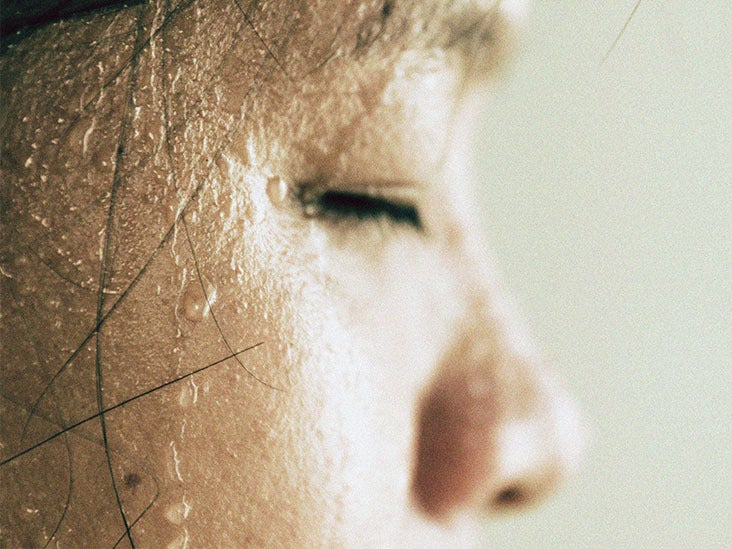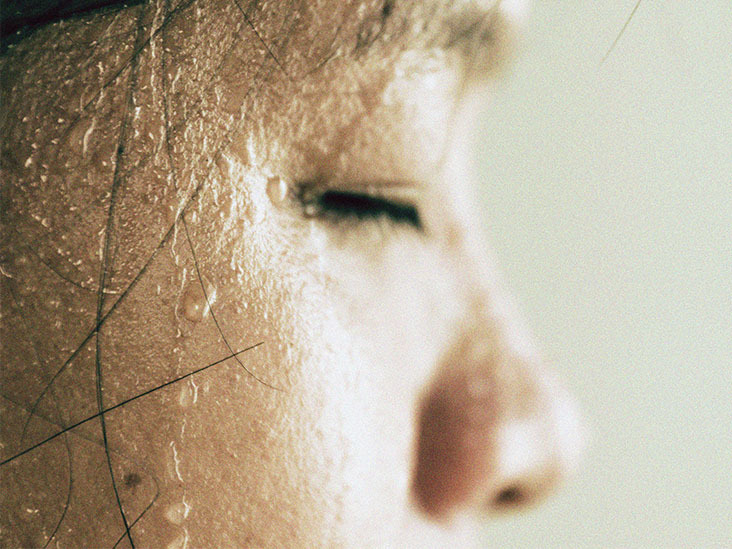
Hot flashes cause a person to feel suddenly hot and sweaty. While perimenopause is a common cause for hot flashes, anxiety can also cause symptoms that resemble a hot flash.
Other physical symptoms of anxiety include rapid or shallow breathing, a fast heartbeat, and feelings of worry or panic.
In this article, we will look at how anxiety may cause hot flashes, how to cope with them, and other potential causes.
A hot flash is a sudden and unexpected feeling of warmth or intense heat. People experiencing a hot flash may feel hot, sweaty, or flushed in their face and neck.
Depending on the cause, a person may also experience heart palpitations, dizziness, or lightheadedness.
Hot flashes are most commonly associated with perimenopause or menopause. However, people can experience symptoms that resemble a hot flash for a variety of reasons.
Feeling hot or flushed is a common symptom of anxiety. In times of panic or stress, a person may feel a sudden sensation of heat, similar to that of a hot flash.
This happens due to the “fight, flight, freeze, or fawn” response, which is the body’s way of preparing for perceived danger. The body releases stress hormones that send blood to the muscles and increase circulation, which can contribute to feeling hot.
As a result, a person may feel unexpectedly hot if caught off guard by anxiety or stress, or if they are experiencing a panic attack.
An older 2006 study found that children with anxiety sometimes experienced sweating and blushing. These and other physical symptoms of anxiety were more pronounced in those with severe anxiety and impairment.
However, it is worth noting that stress and anxiety can also be a hot flash trigger for those in perimenopause. Some people also report experiencing hot flashes or night sweats while on their period.
Other symptoms that may indicate a person is experiencing anxiety include:
- feeling agitated or restless
- feeling “on edge”
- having an elevated heart rate
- breathing quickly or shallowly
- feeling muscle tension or aches
- having difficulty falling or staying asleep
- finding it difficult to concentrate due to anxious thoughts
During a panic attack, which is an intense period of anxiety that typically peaks after several minutes, people develop:
- rapid breathing that is difficult to control (hyperventilation)
- a pounding heart
- a choking sensation, or feeling that something is stuck in the throat (globus pharyngeus)
- sweating
- trembling
- intense panic or feeling that things are out of control
- an urge to escape
Panic attacks can occur because of a specific worry or event, or they may come on unexpectedly.
When a person feels anxious and hot, they can do things to help the feeling pass. These include:
- finding somewhere cool and quiet
- taking some slow, deep breaths
- taking off a layer of clothing, if possible
- drinking some cold water
- continuing to inhale and exhale slowly, focusing on each breath, until feeling less anxious
Other coping techniques people may find helpful include:
It can be difficult to cope with the physical symptoms of anxiety. Sometimes, people fear these symptoms, which creates more anxiety.
Breaking this cycle, and tackling other causes for anxiety, can help. People who regularly feel anxious can seek support and treatment.
Some strategies for managing anxiety include:
- Talk therapy: Talk therapies allow people to talk about how they feel in an understanding, nonjudgemental environment. A therapist can help someone identify the causes for their anxiety and learn how to address them.
- Relaxation techniques: Making relaxation and mindfulness part of a daily routine can help with anxiety, as well as its impact on sleep and concentration. A person may wish to try yoga, tai chi, meditation, mindful hobbies, massage, or spending time in nature.
- Medication: Medications such as antidepressants can relieve the symptoms of anxiety. They do not treat the underlying cause, but they can improve a person’s quality of life and ability to participate in therapy.
- Social support: Connection and support from friends and family can help during anxiety treatment. People can also join support groups and talk to others with similar experiences.
Research suggests that there is a strong association between anxiety, menopause, and hot flashes.
A
Somatic anxiety refers to anxiety that causes physical symptoms. As a result, it may be easy to confuse the symptoms of perimenopause or menopause with the symptoms of anxiety. Sometimes, they may occur at the same time.
Some people may feel anxious about their hot flashes and fear having another. Some may have preexisting anxiety as they enter menopause, which typically occurs around age 45–50.
Doctors often determine if a person is entering menopause based on their symptoms. Sometimes, they may perform a blood test. It is more likely that a person’s hot flashes are menopause related if that person:
- is over the age of 40 and has irregular periods
- has other signs of perimenopause, such as vaginal dryness, dry skin or hair, or mood swings
- notices hot flash triggers that are unrelated to anxiety, such as spicy food, alcohol, hot weather, and hot showers or baths
Menopause can also occur earlier in life. However, for females experiencing hot flash-like symptoms under the age of 40, the cause is less likely to be menopause.
Females experiencing hot flashes may find it helpful to keep a diary to record when they occur and any potential triggers. This may help give someone an idea of whether their symptoms are purely anxiety related, or whether they may be experiencing hormonal shifts.
Some factors can make early menopause more likely, including:
- smoking
- family history of early menopause
- chronic fatigue syndrome, or myalgic encephalitis
- autoimmune diseases that cause the immune system to attack the ovaries
- HIV or AIDS that is not well controlled by medication
- chemotherapy or pelvic radiation therapy, which can temporarily or permanently damage the ovaries
- surgery to remove the ovaries or uterus
- conditions that affect the X chromosome, such as Turner syndrome
In addition to anxiety and menopause, there are some other medical conditions that may cause hot flashes or a general feeling of being too hot. These include:
- hyperthyroidism
- certain medications, especially those that dilate blood vessels or those that affect hormones such as estrogen
- infections, which can cause fever or alternating hot and cold sensations
As a result, it is important to speak with a doctor if hot flashes frequently occur, particularly if they occur when a person does not feel anxious, such as during sleep.
A doctor can perform tests to rule out other conditions, and they can provide support in finding treatment for anxiety, if necessary.
People can experience anxiety and hot flashes during times of stress or during panic attacks. Sweating, rapid breathing, and a fast heartbeat may also indicate anxiety.
Finding a cool place to calm down can help. Breathing exercises, EFT, and other coping strategies can help with short-term anxiety. Treatment for anxiety typically involves therapy and, sometimes, medication.
However, hot flash symptoms and anxiety can also occur in people who are beginning perimenopause or who have other medical conditions. Speak with a doctor to rule out other possibilities.

